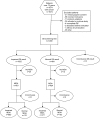Screening for vulnerability in older cancer patients: the ONCODAGE Prospective Multicenter Cohort Study
- PMID: 25503576
- PMCID: PMC4263738
- DOI: 10.1371/journal.pone.0115060
Screening for vulnerability in older cancer patients: the ONCODAGE Prospective Multicenter Cohort Study
Abstract
Background: Geriatric Assessment is an appropriate method for identifying older cancer patients at risk of life-threatening events during therapy. Yet, it is underused in practice, mainly because it is time- and resource-consuming. This study aims to identify the best screening tool to identify older cancer patients requiring geriatric assessment by comparing the performance of two short assessment tools the G8 and the Vulnerable Elders Survey (VES-13).
Patients and methods: The diagnostic accuracy of the G8 and the (VES-13) were evaluated in a prospective cohort study of 1674 cancer patients accrued before treatment in 23 health care facilities. 1435 were eligible and evaluable. Outcome measures were multidimensional geriatric assessment (MGA), sensitivity (primary), specificity, negative and positive predictive values and likelihood ratios of the G8 and VES-13, and predictive factors of 1-year survival rate.
Results: Patient median age was 78.2 years (70-98) with a majority of females (69.8%), various types of cancer including 53.9% breast, and 75.8% Performance Status 0-1. Impaired MGA, G8, and VES-13 were 80.2%, 68.4%, and 60.2%, respectively. Mean time to complete G8 or VES-13 was about five minutes. Reproducibility of the two questionnaires was good. G8 appeared more sensitive (76.5% versus 68.7%, P = 0.0046) whereas VES-13 was more specific (74.3% versus 64.4%, P<0.0001). Abnormal G8 score (HR = 2.72), advanced stage (HR = 3.30), male sex (HR = 2.69) and poor Performance Status (HR = 3.28) were independent prognostic factors of 1-year survival.
Conclusion: With good sensitivity and independent prognostic value on 1-year survival, the G8 questionnaire is currently one of the best screening tools available to identify older cancer patients requiring geriatric assessment, and we believe it should be implemented broadly in daily practice. Continuous research efforts should be pursued to refine the selection process of older cancer patients before potentially life-threatening therapy.
Conflict of interest statement
Figures


References
-
- Mitka M (2003) Too few older patients in cancer trials: experts say disparity affects research results and care. JAMA 290:27–28. - PubMed
-
- Muss HB, Woolf S, Berry D, Cirrincione C, Weiss RB, et al. (2005) Adjuvant chemotherapy in older and younger women with lymph node-positive breast cancer. JAMA 293:1073–1081. - PubMed
-
- Soubeyran P, Fonck M, Blanc-Bisson C, Blanc JF, Ceccaldi J, et al. (2012) Predictors of early death risk in older patients treated by first-line chemotherapy for cancer. J Clin Oncol 30:1829–1834. - PubMed
-
- Hoppe S, Rainfray M, Fonck M, Hoppenreys L, Blanc JF, et al. (2013) Functional Decline in Older Patients With Cancer Receiving First-Line Chemotherapy. Journal of Clinical Oncology 31:3877–3882. - PubMed
Publication types
MeSH terms
LinkOut - more resources
Full Text Sources
Other Literature Sources
Medical

